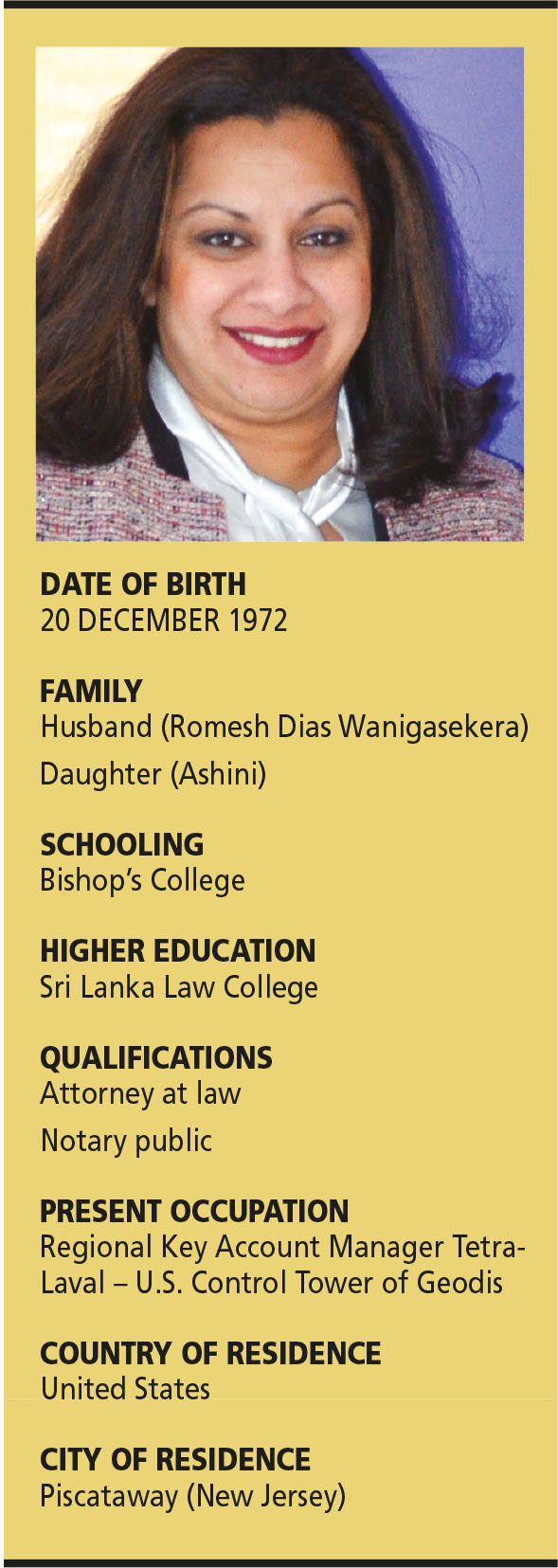SRI LANKANS OVERSEAS
CORRUPTION IS A DISABLER
Corruption is the root cause of our woes – Chandani Mohotti

Q: What are your perceptions of Sri Lanka in the context of its progress in the postwar era?
A: Having migrated to the US in 2001 when Sri Lanka was at the height of its ‘ethnic conflict,’ and considering developments since then and actions taken by successive administrations, I feel Sri Lanka has developed economically and socially.
I wouldn’t consider Sri Lanka to be in a necessarily postwar situation today as it is almost a decade since the conflict ended. After 2009, there were widespread expectations of a period of sustained social, political and economic growth, and we could see some rapid advancement in a country that is rich in terms of its heritage.
On the face of it, one can still see that development in the larger cities, as well as in investments in various projects and infrastructure. Overall, the end of the conflict seems to have had a positive impact on Sri Lanka, which is becoming an attractive South Asian destination for tourism and investment.

Q: How do compatriots in the US view Sri Lanka?
A: Sri Lanka is not widely known in the United States perhaps because we have not been aggressive in creating and promoting awareness. In recent years, the island nation has been highlighted on many prime time television programmes and documentaries aired in the US. But there is no popular curiosity or knowledge of Sri Lanka. Therefore, a majority of Americans are unaware of what the country has to offer.
The few who do know about it and have had the privilege of visiting Sri Lanka marvel at its wonders, and the warm and courteous hospitality of its people, along with the country’s natural beauty, cultural heritage, and breathtaking views and landscapes, which extend from sunny beaches to lush green mountains.
Q: What were your impressions of Sri Lanka on your last visit – has it changed much from the past you remember?
A: I have been fortunate to travel to Sri Lanka every year since we migrated in 2001. My most recent visit was in August last year.
The strides taken in development are quite visible with the construction of many high-rise buildings and apartment complexes including the properties of several world renowned hotel chains that are being constructed in Sri Lanka.
And the fact that you can travel to any part of the island without having to be concerned about safety and security is a relief that’s evident. The constantly changing Colombo skyline, numerous small businesses springing up, and the hustle and bustle of the streets at any time of day are most noticeable – especially in Colombo and its suburbs.
One can only hope that the improvement of public works, and a disciplined regime of cleanliness and hygiene as enforced by the previous administration, will be maintained by present and future governments as well.

Q: Why is there still no discernible reversal of the brain drain?
A: Brain drains stem primarily from poverty, inequality and a lack of opportunity to succeed in life. This in turn causes a lack of prosperity individually, socially and nationally. Sri Lanka continues to witness this trend with both legal and illegal migration of educated individuals seeking better economic prospects elsewhere.
There is also a yearning for a better quality of life and higher standard of living, a more organised and disciplined way of life, an affordable cost of living, being able to provide advanced education for one’s offspring and having the opportunity to succeed if only one is willing to work hard.
Sri Lanka’s education system continues to be conventional and does not seem to provide the opportunities or requisite expertise for students to survive in the global arena. This is one of the main reasons why many families are sending their children overseas for higher education. How many of these children will come back to their mother country remains to be seen.
Q: What must be done to entice Sri Lankans living overseas to contribute or return to their country of birth?
A: For Sri Lankans who have migrated to return or contribute to national development would mean that they will need to be offered a rational and worthwhile reason for doing so!
Making the decision to migrate involves a calculated risk, often entailing scenarios where you may literally sacrifice your life in order to start all over again somewhere else. It is never an easy process when you have to adjust to different languages, cultures, food and lifestyles, on top of severing ties with your motherland.
The only reason for an emigrant Sri Lankan to return and contribute to the land of his or her birth would be if the economic, social and political conditions were conducive. They should be able to avail themselves of the same level of opportunities they enjoy overseas. Other factors include the cost of living, healthcare and safety conditions, comfortable lifestyles, monetary savings, the ability to enjoy retirement with proper medical and senior citizen facilities, and high quality amenities and services, sans the corrupt and prejudicial systems that are currently entrenched in Sri Lanka.
Q: So what should Sri Lanka focus on most in the coming decade to achieve some of this parity?
A: It must focus primarily on eradicating corruption. There will be little progress if the elected and appointed politicians running the country are corrupt, and the people lose their trust and confidence in them.





Leave a comment